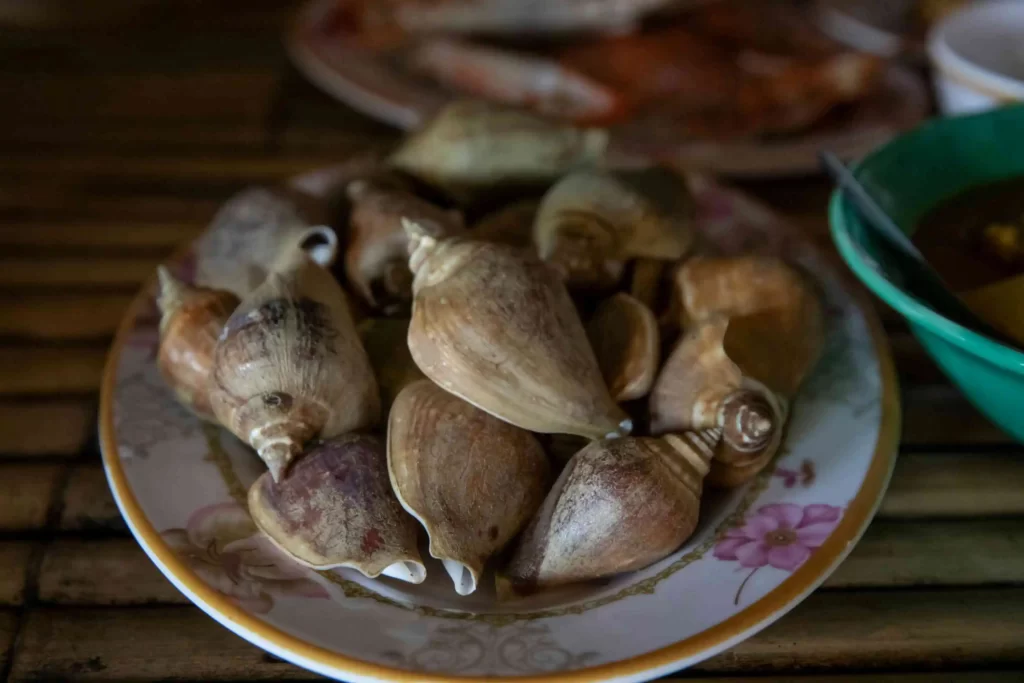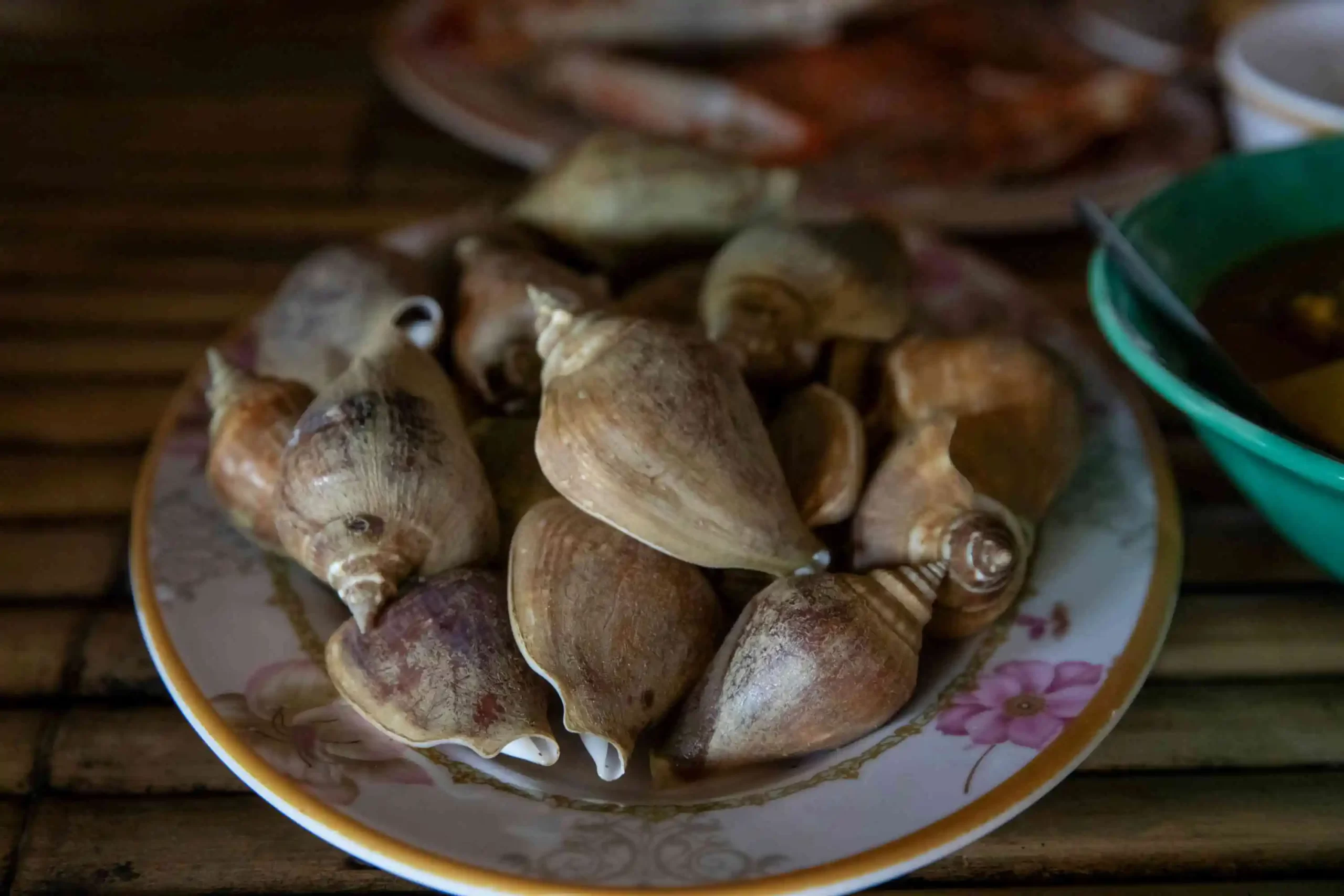Food has a unique ability to transport us to distant shores, offering a glimpse into cultures and traditions from around the world.
Among the treasures of the sea, conch stands out as a delicacy celebrated in various cuisines.
This marine mollusk has intrigued food enthusiasts with its distinctive taste and texture, prompting the question: What does conch taste like?

Table of Contents
Understanding the Conch
Before diving into the gustatory experience of conch, it’s essential to understand what this marine creature is.
The conch, pronounced “konk,” refers to a variety of large sea snails with spiral shells, belonging to the family Strombidae.
These gastropods are found in warm saltwater environments across the Caribbean, the Gulf of Mexico, and parts of the Atlantic Ocean.
Read: What Do Mussels Taste Like? Do They Taste Like Oysters?
Culinary Heritage of Conch
Throughout history, conch has been a staple in the diets of coastal communities.
Its meat, encased within its robust shell, serves as a source of sustenance and culinary inspiration.
From the Caribbean islands to the Bahamas and the Florida Keys, conch has played a prominent role in traditional dishes.
Read: What Does Swordfish Taste Like? Does It Taste Good?
Harvesting and Preparation
Harvesting conch is a skilled endeavor, often involving free-divers who plunge into the depths to collect these mollusks.
Once harvested, the conch is carefully extracted from its shell, and its meat is meticulously cleaned, tenderized, and prepared for cooking.
Read: What Does Butter Chicken Taste Like? 8 Ways to Increase the Taste.
Culinary Versatility
Conch’s culinary versatility is noteworthy. It can be enjoyed in various forms: raw, as ceviche, in soups, stews, salads, fritters, or even grilled.
Each method of preparation offers a unique dining experience, showcasing the adaptability of this marine delicacy.

What Does Conch Taste Like?
The flavor profile of the conch is a harmonious blend of textures and tastes.
Describing its taste can be a challenge due to its unique amalgamation of flavors:
1. Sweetness:
Fresh conch meat exudes a subtle sweetness, reminiscent of the sea. This sweetness is mild yet distinct, contributing to the overall flavor profile.
2. Brininess:
Given its origin in saltwater habitats, conch carries a pleasant brininess that reflects its marine essence. This savory note adds depth to its taste.
3. Firm Texture:
The texture of cooked conch is a defining characteristic. When properly prepared, it boasts a firm, slightly chewy consistency that lends itself well to various cooking methods.
4. Mild Nuttiness:
Conch often possesses a mild nutty undertone, which complements its other flavors. This subtle nuance adds an intriguing dimension to its taste profile.
Influencing Factors
Several factors can influence the taste of conch:
1. Freshness:
The freshness of conch significantly impacts its taste. Consuming freshly harvested conch offers the purest essence of its flavor.
2. Preparation Method:
Different culinary techniques—such as raw preparations like ceviche or cooked dishes like fritters—alter the taste and texture of conch, offering diverse gustatory experiences.
3. Seasonings and Pairings:
The way conch is seasoned or paired with other ingredients can significantly influence its taste. Herbs, spices, and accompanying elements play a pivotal role in enhancing or altering its flavor profile.
Culinary Recommendations
For those seeking to experience the taste of conch, exploring regional dishes where it’s a staple can provide an authentic introduction.
From classic Bahamian conch salad to Jamaican conch soup, each dish offers a unique perspective on the mollusk’s flavor.
Side Effects and Considerations
While conch offers a delectable culinary experience for many, it’s essential to be aware of potential side effects and considerations associated with consuming this seafood delicacy.
1. Allergies:
Individuals with shellfish allergies should exercise caution when consuming conch.
Despite being a gastropod and not a crustacean, conch can trigger allergic reactions in some people with sensitivities to shellfish.
2. Mercury Content:
Like many other marine species, conch may contain traces of mercury, a heavy metal that can be harmful in high quantities.
Pregnant women, nursing mothers, and young children should moderate their consumption of conch due to its potential mercury content.
3. Digestive Sensitivities:
Some individuals might experience digestive issues after consuming conch, particularly if it is not properly cooked or if they have a sensitive digestive system.
Overconsumption or improperly prepared conch can lead to stomach discomfort, nausea, or diarrhea in sensitive individuals.
4. Gout:
Individuals prone to gout or with existing gout conditions should be cautious when consuming conch.
High levels of purines found in conch could potentially trigger gout flare-ups or exacerbate the condition.
5. Sustainable Harvesting:
Due to overfishing and environmental concerns, the sustainability of conch populations has become a significant issue.
Consumers should strive to source conch from sustainable fisheries or aquaculture to support responsible harvesting practices.
Precautions and Recommendations
To mitigate potential risks associated with consuming conch, consider the following precautions:
- Allergy Testing: If allergic to shellfish, consult with a healthcare professional or undergo allergy testing before consuming conch to avoid adverse reactions.
- Moderation: Consume conch in moderation, especially for vulnerable groups such as pregnant women, young children, and individuals with health conditions.
- Thorough Cooking: Ensure conch is thoroughly cooked to minimize the risk of foodborne illnesses and to aid in digestion.
- Sustainable Sourcing: Purchase conch from reputable sources that adhere to sustainable fishing practices to support the conservation of marine ecosystems.
Conclusion
In the realm of seafood, conch stands as an enigmatic and delightful option. Its sweet, briny essence coupled with a firm texture makes it a prized ingredient in diverse cuisines.
Exploring the taste of conch allows for a sensory journey that connects us to coastal traditions and the bounties of the sea.
As culinary enthusiasts continue to seek new gastronomic adventures, the question “What does conch taste like?” invites exploration, encouraging individuals to indulge in the flavors of the sea and expand their palates.
Whether savored in a beachside shack or a fine-dining establishment, conch presents an opportunity to appreciate the wonders of marine gastronomy.
Ultimately, the taste of conch is best experienced firsthand—an invitation to embark on a culinary voyage, embracing the nuances of this intriguing marine mollusk.

